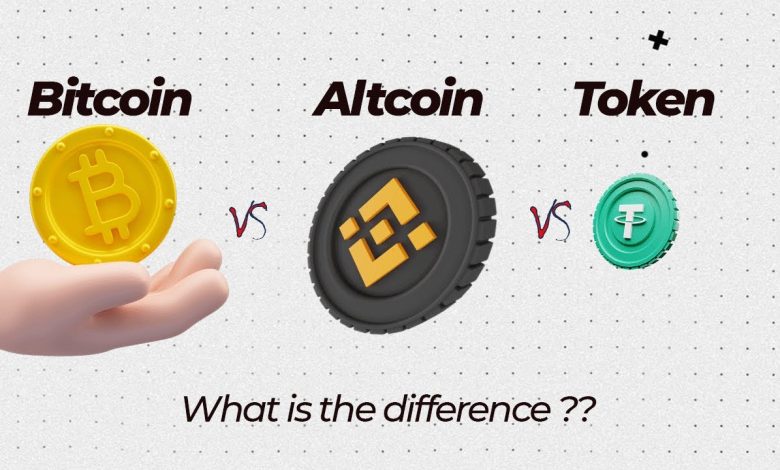The Difference Between Bitcoin and Altcoins

- Understanding Bitcoin and Altcoins
- Key Characteristics of Bitcoin
- Exploring the World of Altcoins
- Comparing the Technology Behind Bitcoin and Altcoins
- Investing in Bitcoin vs. Altcoins
- The Future of Cryptocurrency: Bitcoin and Altcoins
Understanding Bitcoin and Altcoins
Bitcoin and altcoins are both types of cryptocurrencies, but they have some key differences. Bitcoin is the first and most well-known cryptocurrency, created in 2009 by an unknown person or group of people using the pseudonym Satoshi Nakamoto. Altcoins, on the other hand, refer to any cryptocurrency other than Bitcoin.
While Bitcoin is often seen as a store of value or digital gold, altcoins serve different purposes. Some altcoins are designed for specific use cases, such as smart contracts or decentralized applications. Others may focus on privacy, scalability, or governance features.
Investing in altcoins can be riskier than investing in Bitcoin, as they often have smaller market caps and less liquidity. However, altcoins also have the potential for higher returns due to their lower prices and the possibility of rapid growth.
It’s essential to understand the differences between Bitcoin and altcoins before investing in cryptocurrencies. Bitcoin is the most established and widely accepted cryptocurrency, while altcoins offer a range of options for investors looking to diversify their portfolios. By doing thorough research and staying informed about the latest developments in the cryptocurrency market, investors can make informed decisions about which cryptocurrencies to buy and hold for the long term.
Key Characteristics of Bitcoin
Bitcoin has several key characteristics that set it apart from other cryptocurrencies, such as altcoins. These characteristics include:
- Decentralization: Bitcoin operates on a decentralized network, meaning that it is not controlled by any single entity or government. This decentralization helps to ensure the security and integrity of the Bitcoin network.
- Scarcity: There will only ever be 21 million bitcoins in existence, making it a deflationary asset. This scarcity is built into the code of Bitcoin and helps to protect its value over time.
- Transparency: All Bitcoin transactions are recorded on a public ledger called the blockchain. This transparency helps to prevent fraud and ensures that all transactions are secure and verifiable.
- Security: Bitcoin uses cryptographic techniques to secure transactions and protect the network from hacking and fraud. This high level of security has helped to establish Bitcoin as a trusted form of digital currency.
- Anonymity: While Bitcoin transactions are transparent, the identities of the parties involved are not always known. This anonymity can be appealing to those who value privacy and security in their financial transactions.
Overall, Bitcoin’s key characteristics make it a unique and valuable cryptocurrency that has gained widespread adoption and acceptance in the financial world. Its decentralized nature, scarcity, transparency, security, and anonymity all contribute to its appeal as a digital currency for the future.
Exploring the World of Altcoins
When it comes to altcoins, there is a vast and diverse world waiting to be explored beyond Bitcoin. Altcoins are alternative cryptocurrencies to Bitcoin, each with its unique features and purposes. These digital assets offer investors and users a wide range of options to diversify their portfolios and participate in various blockchain projects.
One of the key differences between Bitcoin and altcoins is the technology behind them. While Bitcoin was the first cryptocurrency created using blockchain technology, altcoins have since evolved to incorporate different consensus mechanisms, privacy features, and smart contract capabilities. This diversity in technology allows altcoins to cater to specific use cases and address different market needs.
Investing in altcoins can be both exciting and risky. The volatility of the cryptocurrency market means that prices can fluctuate dramatically in a short period. It is essential for investors to conduct thorough research and due diligence before investing in any altcoin. Understanding the project’s whitepaper, team, roadmap, and community can help investors make informed decisions and mitigate risks.
Some popular altcoins include Ethereum, Ripple, Litecoin, and Cardano, each offering unique value propositions and use cases. Ethereum, for example, is known for its smart contract capabilities, allowing developers to build decentralized applications (dApps) on its blockchain. Ripple, on the other hand, focuses on facilitating cross-border payments for financial institutions.
As the cryptocurrency market continues to evolve, new altcoins are constantly being introduced, each with its innovative features and technologies. Keeping up with the latest developments in the altcoin space can provide investors with opportunities to capitalize on emerging trends and potentially high-growth projects. However, it is crucial to exercise caution and only invest what you can afford to lose in this volatile market.
Comparing the Technology Behind Bitcoin and Altcoins
When comparing the technology behind Bitcoin and altcoins, it is important to note that while Bitcoin was the first cryptocurrency created, altcoins have since emerged with different technological features and capabilities. Bitcoin operates on a decentralized network using blockchain technology, which is a public ledger that records all transactions. Altcoins, on the other hand, may use different consensus mechanisms, such as proof of stake or proof of work, to validate transactions.
One key difference between Bitcoin and altcoins is the hashing algorithm used to secure the network. Bitcoin uses the SHA-256 algorithm, while altcoins like Ethereum use the Ethash algorithm. This difference in algorithms can impact the speed and security of transactions on each network. Additionally, altcoins may offer additional features such as smart contracts, which allow for programmable, self-executing contracts on the blockchain.
Another factor to consider when comparing the technology behind Bitcoin and altcoins is scalability. Bitcoin has faced challenges with scalability, leading to slow transaction times and high fees during periods of high network activity. Altcoins have sought to address these issues by implementing solutions such as the Lightning Network or sharding to improve scalability and transaction speeds.
Investing in Bitcoin vs. Altcoins
When it comes to investing in cryptocurrencies, one of the main decisions investors face is whether to put their money into Bitcoin or altcoins. Both options have their own set of advantages and disadvantages, so it’s important to understand the differences between the two before making a decision.
Bitcoin is the original cryptocurrency and is often seen as a more stable investment compared to altcoins. It has a larger market cap and is more widely accepted as a form of payment. On the other hand, altcoins are newer cryptocurrencies that offer more potential for high returns but also come with higher risks.
Investing in Bitcoin can be a safer option for those looking for a more conservative investment strategy. However, altcoins can provide opportunities for investors to capitalize on emerging technologies and trends in the cryptocurrency market.
Ultimately, the decision between investing in Bitcoin or altcoins will depend on your risk tolerance, investment goals, and overall market outlook. It’s important to do thorough research and consider seeking advice from financial professionals before making any investment decisions in the cryptocurrency space.
The Future of Cryptocurrency: Bitcoin and Altcoins
The future of cryptocurrency is an exciting and rapidly evolving landscape that is dominated by Bitcoin and various altcoins. While Bitcoin remains the most well-known and widely used cryptocurrency, altcoins are gaining popularity and challenging its dominance.
Altcoins, or alternative cryptocurrencies, offer unique features and functionalities that differentiate them from Bitcoin. Some altcoins focus on privacy and anonymity, while others prioritize speed and scalability. This diversity in the cryptocurrency market provides users with a wide range of options to choose from.
As the cryptocurrency market continues to mature, it is likely that both Bitcoin and altcoins will play important roles in shaping the future of digital currency. Investors and enthusiasts are closely watching developments in the cryptocurrency space to identify opportunities for growth and innovation.
Whether you are a seasoned cryptocurrency investor or a newcomer to the space, staying informed about the latest trends and developments in Bitcoin and altcoins is essential. By understanding the differences between these cryptocurrencies and their potential impact on the future of currency, you can make informed decisions and navigate the cryptocurrency market with confidence.



